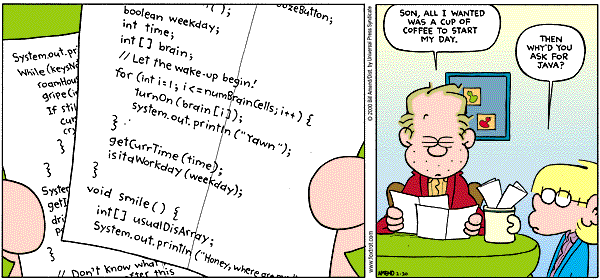
| Kiri Wagstaff
4139 Upson Hall Email: wkiri@cs.cornell.edu Phone: 255-4934 |
Lecture: Mon - Fri, 10 - 11:15 a.m.
Location: Upson B17 June 25 - August 3 (Holiday: Weds, July 4) |

Welcome to CS 100! This course will introduce techniques for analyzing a problem or task and developing a computer program (algorithm) to solve it. These skills transcend any single programming language. Our main focus will be on Java programming, but we will also spend some time with Matlab. For detailed information on the course content, see the Course Objectives.
Normally, this course meets twice a week over a semester (15 weeks, 15 * 2 = 30 lectures). Because we only have six weeks for the summer session, we'll have lecture every day (6 * 5 = 30 lectures). However, despite the fact that there will be the same total amount of lecture time, the course is still likely to be more demanding than it would be if you took it in the Fall or Spring, since we'll be covering 2.5 weeks' worth of material each week! So do your best to come to class prepared, keep up with the assignments, and bring your sense of humor; we're going to cover a lot, and we plan to have fun doing it.
This document contains a lot of information. Look here first to answer questions about the course. You are responsible for familiarizing yourself with the course policies contained herein.
The following are some important dates related to the course:
In addition to the instructor (see above), we are blessed with three teaching assistants. We encourage you to come to our office hours. If you need to contact the course staff, send email to cs100@cs.cornell.edu.
| Name | Office location | Hours | Phone | |
| Kiri Wagstaff | 4139 Upson | Mon, Wed, Fri 1-2 p.m.
or by appointment |
wkiri@cs.cornell.edu | 255-4934 |
| Jay Henniger | Upson lab (B7) | Tues, 11:30 a.m. - 1:30 p.m. | henniger@cam.cornell.edu | |
| Ben Mathew | 4104 Upson | Mon, Wed, Fri 2-3 p.m.
or by appointment |
btm3@cornell.edu | 255-9537 |
| Hongjie Yang | Upson Hall (328) | Thurs, 11:30 a.m. - 1:30 p.m. | hy63@cornell.edu |
We are also assisted by three consultants, whom you no doubt will get to know very well in the Carpenter lab:
| Name | |
| Radha Narayan | rn34@cornell.edu |
| Jason Palmer | jdp15@cornell.edu |
| Sada Williams | smw22@cornell.edu |
At the conclusion of this course, you should be able to:
Make sure you have read the Cornell University Code of Academic Integrity and the Computer Science Addendum.
The table below indicates how much each part of the course contributes to your final grade.
| Prelim 1 (Friday, July 6) | 15% |
| Prelim 2 (Friday, July 20) | 15% |
| Final (Tuesday, August 7) | 20% |
| Exercises (15) | 10% |
| Assignments (4) | 20% |
| Projects (2, 10% each) | 20% |
The prelims will be held at the regular lecture time, in Upson B17. The final will be held on Tuesday, August 7, from 8:00 to 10:00 a.m. in Upson B17.
| Exercises are short problems designed to give you some quick
practice with topics covered in lecture, and will be given either a "1"
or a "0". They will not be graded very rigorously; getting "the main idea"
is sufficient for a 1. These exercises are mainly for your benefit; they
provide you with quick feedback. Assignments will be longer than the Exercises, usually covering several topics. Earlier assignments will be simpler and therefore weighted less than later assignments. Each assignment will be given two grades: one for correctness, and one for style. Projects will come later in the course and give you the opportunity to work on interesting (i.e. larger) problems. Projects will also be given grades for correctness and style. More details will be provided in the relevant handouts. |
Bonus points: Some assignments may specify that you can earn bonus points by going above and beyond the stipulated assignment. Bonus points might raise your letter grade about a third of a grade, e.g. C+ to B- but not C+ to B. They will be considered after determining your letter grade based on your raw numerical score (thus they will not affect the distribution of grades in the class).
Class Participation: We will not be taking attendance in this course, but it is to your advantage to actively participate in class. You'll get more out of the course and will likely enjoy it more as well. This does not necessarily mean that you must participate in class by asking questions or volunteering answers. There are other ways you can participate: actively attend office hours, get involved on the newsgroup, provide feedback on the course (questions about content, suggestions for improvement) via email to the instructor or TAs, etc.
Late work: Because this course is compressed into six weeks, and we want to return graded work as soon as possible, we cannot accept late work. Assignments are due at the start of lecture. If you come in late, please wait until the end of lecture to hand in your work. It will not be considered "late" until the instructor steps out of B17 after lecture.
If you foresee difficulty in submitting a project on time, or anticipate missing a prelim, due to a serious illness or death in your immediate family, notify us as soon as possible and we will do our best to work with you.
Special Needs: If you require special accommodations for test-taking conditions or for attending lectures, please let the instructor know as soon as possible.